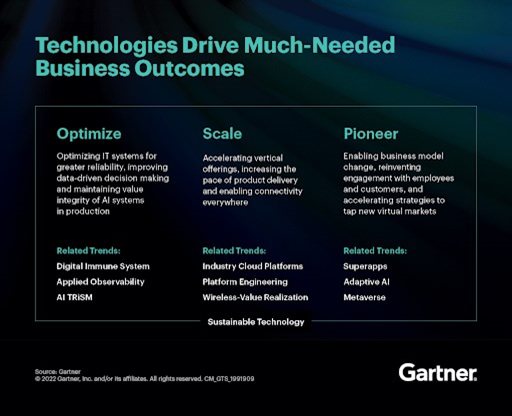As we unpack previous years achievements and plan for 2023, we see a common trend of heavy investment from stakeholders into the development of cloud services on the African continent; with the streaming giants bringing more content and the hyperscalers expanding their local footprint by investing in subsea cables and points of presence in both Cape Town and Johannesburg.
This has provided a platform to startups, allowing them to build smarter and more resilient applications at a fraction of the cost and time that would have been ten years ago when running on traditional hosting platforms and on-premise server infrastructure.
If we review the cloud trends listed by Gartner, the growth of cloud usage will see a further 20.7% increase globally during 2023. What does that mean for the South African cloud ecosystem? Private and public sectors are gaining a deeper understanding of the business value and business growth potential of using sustainable cloud-based technologies to deliver services faster and increase customer satisfaction.
In the coming year, we will see more use of cloud computing to deliver game-changing services to the public sector that will drive innovation and provide smart city capabilities. In the City of Cape Town, the Mayor Geordin Hill-Lewis, has noted the city is using cloud technologies to provide a safer, more efficient city.
CloudZA’s Technologies Trend for 2023
1. Remote learning
Through using cloud-based technologies the education sector can provide remote and in-house learning facilities (blended learning) using the highly-available and scalable nature of the cloud to deliver high concurrency, AI proctoring and the ability to scale when the demand is needed - driving global inclusive learning.
2. Serverless and event-driven apps
Serverless offers developers and data scientists the ability to build and run code without having to manage the underlying servers and infrastructure, developers will not need to manage the scaling and provisioning of resources. With event-driven applications, the code is only run when an event is triggered, ideal for stateless applications. The user pays for when the code is executed, in turn only paying for the consumption of the resources required to execute the code.
This is very appealing to backend developers that don’t have the knowledge or skills to manage the underlying infrastructure running a modern application stack. This reduces the time taken to deploy the application and allows to fix bugs in the application code locally before moving to a public cloud provider. Essentially the computing element is managed by the cloud provider and the code is deployed when triggered.
3. Bridging the skills gap
As we have seen in the past, there has been a massive skills shortage for cloud computing and developer skills locally, with the training and certification freely available on multiple learning platforms to engage with individuals as well as learnership programmes to work with youth to build needed skills and develop the required skills to work on enterprise level solutions. Partnerships and learnerships with AWS South Africa as well as the DTI and various non-profit organisations provide amazing training programmes to bridge the skills gaps locally. By 2025, individuals will have two years of real-world experience building in the cloud.
4. Optimisation of the cloud
Optimisation is an ongoing trend, as more and more organisations start implementing cloud-based solutions to achieve their business outcomes. This has seen an increase in the costs associated with the organisation's cloud spend. Looking into a serverless model which reduces the need to run always on instances assists with optimising workloads. Working with a cloud partner is also a good option to work through the migration strategy and to optimise production workloads in the cloud environment.
5. Society 5.0 in 2023
Society 5.0 implementation of the cyber-physical world; Internet of Things (IoT) will fuel the remote delivery of goods; Artificial intelligence will be at the forefront for 2023. We are seeing daily the capabilities of chatbots and the implementation of OCR for number plate recognition, soon we will see the virtual world meeting the physical with no barrier between them. Smart cities and autonomous driving is the path for technology for the next few years.
6. Sustainability
Sustainability will be a huge driver for organisations in 2023. Organisations are looking at ways to reduce their total carbon footprint by using cloud economies of scale, organisations can reduce the carbon footprint by up to 35% versus running on-premise or in a single datacenter. Amazon is committed to renewable energy with a solar plant in the Northern Cape providing 28,000MwH, contributing towards South Africa’s renewable energy goals for 2030.
In summary, CloudZA’s driver for 2023
We are optimistic about 2023’s direction, with three of the major global hyperscalers investing heavily in the African continent. Skills development through learnerships and investments through black owned business, as well as the massive infrastructure upgrades such as the Equiano cable, going up the west coast of Africa and providing approximately 20 times more network capacity while reducing latency. This shows that South Africa is an emerging tech hub and 2023 shows great potential for the South African technology industry.

















































